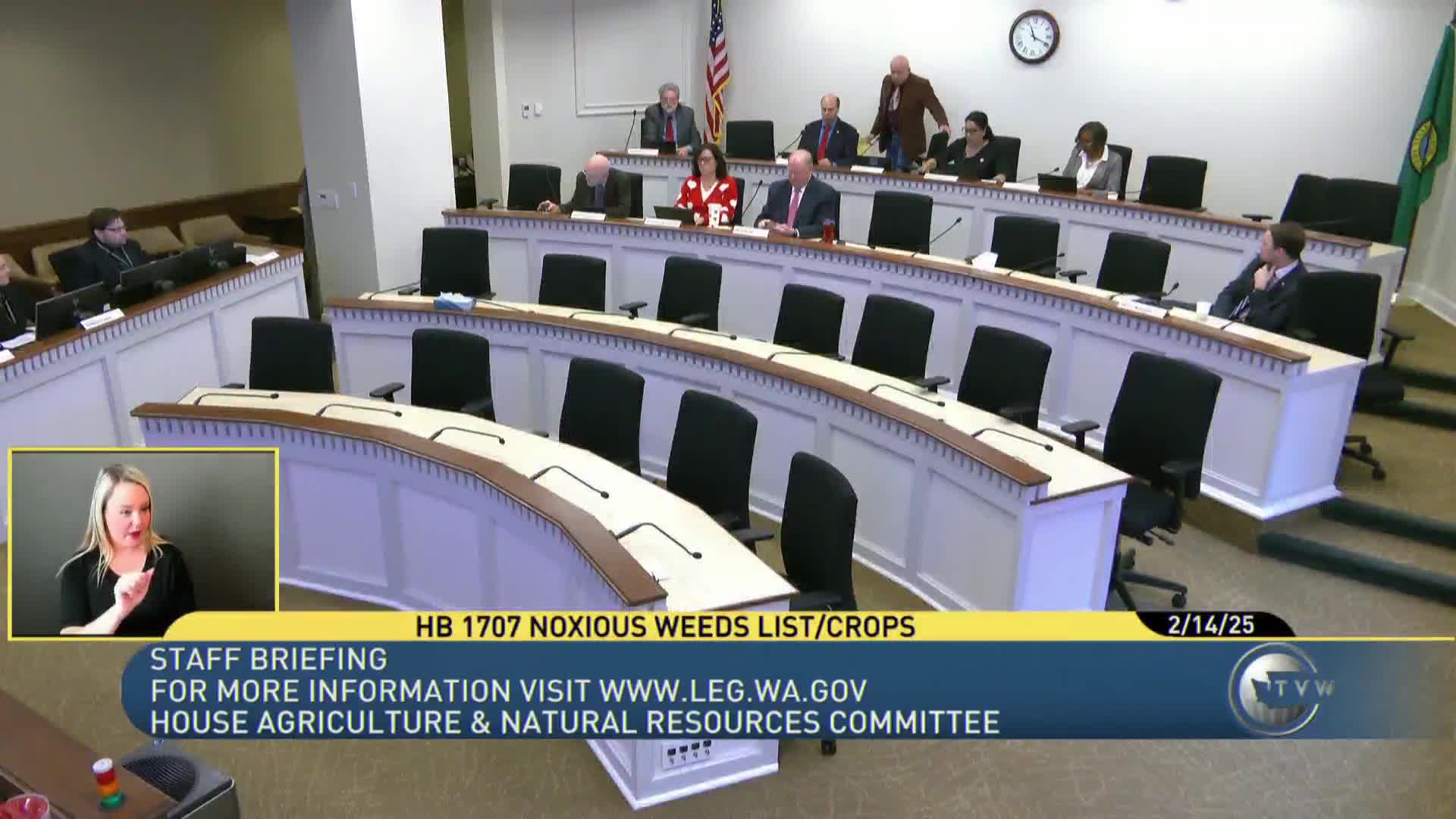Heated testimony as committee hears bill to require work group review before listing agricultural crops as noxious weeds
Get AI-powered insights, summaries, and transcripts
Subscribe
Summary
House Bill 1707 would require the State Noxious Weed Control Board to convene a work group convened by the Department of Agriculture and hold additional review before listing agricultural crops as noxious weeds; testimony included strong views from county weed-board members, growers, the state weed board and conservationists.
The House Agriculture and Natural Resources Committee received extensive public testimony Feb. 14 on House Bill 1707, a bill that would require the State Noxious Weed Control Board to hold a Department of Agriculture–convened work group and public hearing before listing an agricultural crop as a noxious weed.
Rebecca Lewis, committee staff, summarized the bill and its background, noting that the state noxious weed control board currently must annually adopt a state noxious weed list and guidelines for listing species. Lewis said HB 1707 would require the board's guidelines to prohibit listing agricultural crops as noxious weeds until the board receives and conducts a public hearing on recommendations from a work group convened by the Department of Agriculture. "The work group must include affected agricultural producers and at least one member of the board," she said.
Sponsor Representative Tom Dent (13th District) framed the bill as a transparency and fairness measure to prevent unintended consequences for commercial growers when a plant is proposed for listing. Dent said listing a plant as a noxious weed can "immediately give that plant kind of a negative connotation" and potentially harm growers' livelihoods; he urged an extra step to ensure affected stakeholders are heard.
Public testimony produced sharply divided views. Supporters included growers from holly farms and county weed-board members who said the current board process had not provided adequate transparency or consideration of economic impacts in some cases. Kenneth and Dee Bajema of Columbia Gorge Holly Farms said earlier attempts to list holly had threatened a long-standing commercial industry and urged a strengthened process that guarantees stakeholder input and appeals. Robert Bauer (Forbeast Farm) and other growers said the bill was about "good government" and preventing mistakes that could cost farmers.
Opponents included current and former members of county and the state noxious weed boards, county weed-district supervisors and many conservation and ecological experts. Alan Evenson, supervisor of Grant County Weed District 3 and chair of the Washington State Noxious Weed Control Board, testified he opposed HB 1707, saying the board already conducts thorough reviews that include scientific, economic and stakeholder input and that the bill is redundant. Multiple county weed-board members and staff described the current listing process — including scientific review, stakeholder meetings, farm tours and hearings — as adequate and argued the bill would create delays and give commercial interests an effective veto over listing decisions. Mary Fee, speaking for the State Noxious Weed Control Board, said the board is neutral and suggested an amendment to allow the board to list species with special exceptions (for example, "wild carrot, except where commercially grown").
Many witnesses cautioned that most invasive plant species enter through the nursery trade and that adding procedural barriers could hamper timely action to control species that threaten ecosystems and agricultural lands. Witnesses opposing the bill warned that the proposal 'could be used as a veto power in essence into the hands of those profiting from not listing a plant as a noxious weed.' Several county weed-board members urged the Legislature to work with the board on narrowly tailored changes rather than creating a new legislative hurdle.
The committee closed the public hearing after a large number of in-person and remote statements. Staff recorded that 283 people signed in pro, 68 con and 0 other on the bill. No committee vote on HB 1707 occurred during the Feb. 14 session.
